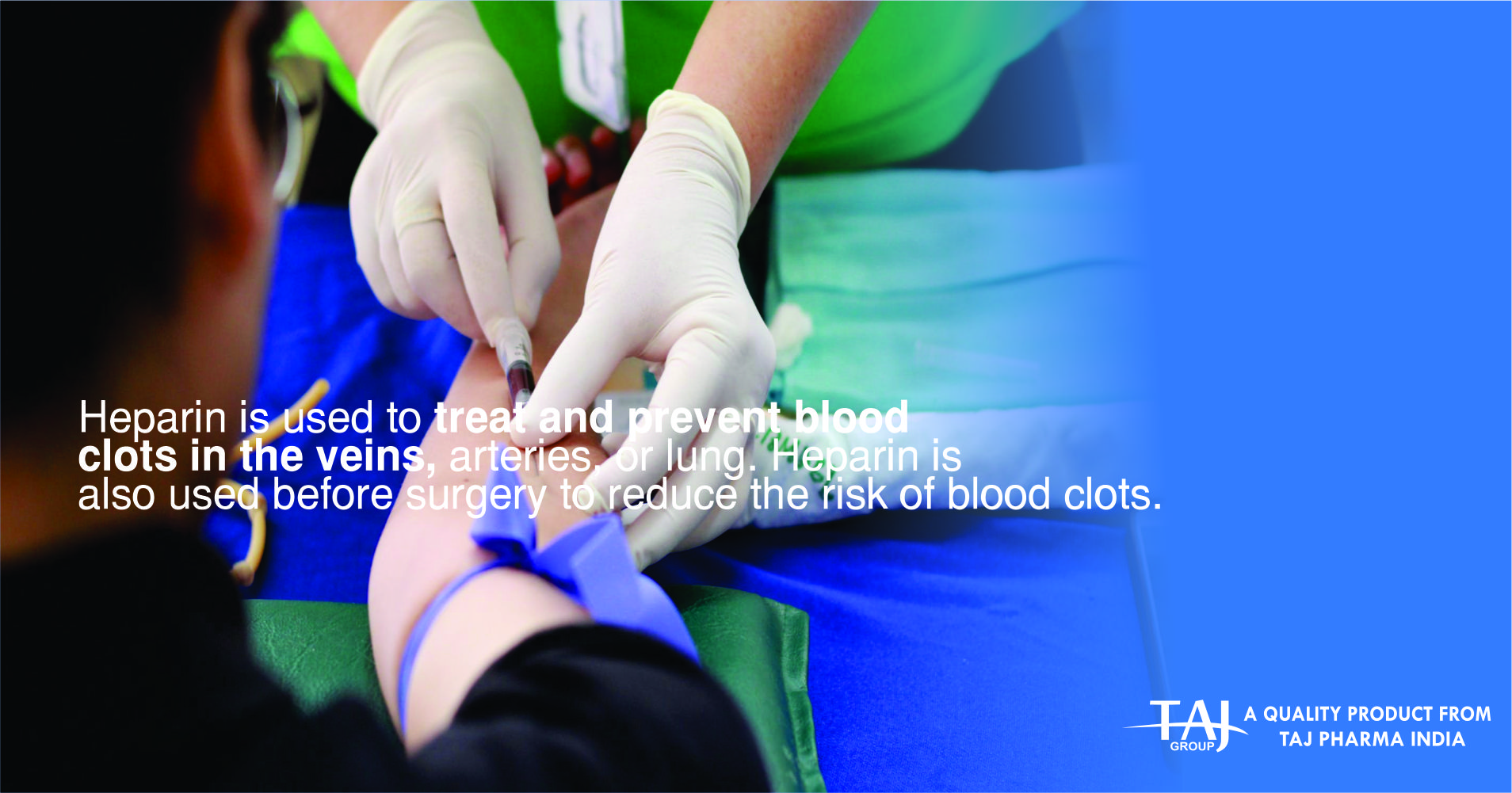Heparin sodium solution for injection
Heparin injection is an anticoagulant. It is used to decrease the clotting ability of the blood and help prevent harmful clots forming in blood vessels. This medication is used to prevent and treat blood clots. It may be used to prevent and treat blood clots in the lungs/legs (including in patients with atrial fibrillation). It may be used to treat certain blood clotting disorders. It may also be used to prevent blood clots after surgery, during dialysis, during blood transfusions, when collecting blood samples, or when a person is unable to move for a long time. Heparin helps to keep blood flowing smoothly by making a certain natural substance in your body (anti-clotting protein) work better. It is known as an anticoagulant.
Read More
y o uc a nk n o wm o r e
Our business services
Taj Pharma is one of the largest generic pharmaceutical company in India. We hold top positions in different established markets worldwide and are building a strong presence in many emerging generics markets. You can contact Taj Pharma India's business by telephone on + 91 022-2637-4592, if you have an enquiry about the company, our healthcare business, or one of our medicines.
Heparin is an anticoagulant (blood thinner) that prevents the formation of blood clots.
We would like to give you an overview of Taj Pharmaceuticals Limited in India.
This section displays common question about the Heparin Sodium solution for injection.
214, Bake House, Bake House Lane,
Fort, Mumbai 400001, India
Heparin Indiactions
Heparin sodium is indicated for:
Atrial fibrillation with embolization:
Treatment of acute and chronic consumption coagulopathies (disseminated intravascular coagulation);
Prevention of clotting in arterial and heart surgery;
Anticoagulant therapy in prophylaxis and treatment of venous thrombosis and its extension;
(In a low-dose regimen) for prevention of postoperative deep venous thrombosis and pulmonary embolism in patients undergoing major abdomino-thoracic surgery or who for other reasons are at risk of developing thromboembolic disease (see DOSAGE AND ADMINISTRATION);
Prophylaxis and treatment of pulmonary embolism;
Prophylaxis and treatment of peripheral arterial embolism.
Contraindications
Heparin sodium should not be used in patients:
With severe thrombocytopenia;
In whom suitable blood coagulation tests — e.g., the whole blood clotting time, partial thromboplastin time, etc. — cannot be performed at appropriate intervals (this contraindication refers to full-dose heparin; there is usually no need to monitor coagulation parameters in patients receiving low-dose heparin);
With an uncontrollable active bleeding state (see WARNINGS), except when this is due to disseminated intravascular coagulation.
Intravenous solutions with Heparin Sodium Injection are contraindicated in patients who are hypersensitive to heparin.
Click here for Download pdf of patient information
Click here for Download pdf of prescribing information
Clinical Pharmacology
Heparin inhibits reactions that lead to the clotting of blood and the formation of fibrin clots both in vitro and in vivo. Heparin acts at multiple sites in the normal coagulation system. Small amounts of heparin in combination with antithrombin III (heparin cofactor) can inhibit thrombosis by inactivating activated Factor X and inhibiting the conversion of prothrombin to thrombin. Once active thrombosis has developed, larger amounts of heparin can inhibit further coagulation by inactivating thrombin and preventing the conversion of fibrinogen to fibrin. Heparin also prevents the formation of a stable fibrin clot in inhibiting the activation of the fibrin stabilizing factor.
Bleeding time is usually unaffected by heparin. Clotting time is prolonged by full therapeutic doses of heparin; in most cases, it is not measurably affected by low doses of heparin.
Peak plasma levels of heparin are achieved 2 to 4 hours following subcutaneous administration, although there are considerable individual variations. Loglinear plots of heparin plasma concentrations with time for a wide range of dose levels are linear which suggests the absence of zero order processes. Liver and the reticuloendothelial system are the site of biotransformation. The biphasic elimination curve, a rapidly declining alpha phase (t½ = 10') and after the age of 40 a slower beta phase, indicates uptake in organs. The absence of a relationship between anticoagulant half-life and concentration half-life may reflect factors such as protein binding of heparin.
Heparin does not have fibrinolytic activity;
Our Partners
A dream for new world Anchored in India and committed to its traditional values of leadership with trust, the Taj Pharma Group is spreading its footprint globally through excellence and innovation.Taj Pahrma India.















Important Safety Information
Allergy warning
Beprin can cause a severe allergic reaction. Symptoms can include: skin tissue death at the injection site, chills, fever, rash, hives, itching, burning, shortness of breath, swelling of your face, lips, throat, or tongue If you develop these symptoms, go to the nearest emergency room.
Don’t take this drug again if you’ve ever had an allergic reaction to it. Beprin is derived from animal tissue. It should be used with caution in people with a history of allergy to this drug or to pig proteins. Taking beprin could be fatal (cause death).
Warnings for people with certain health conditions
For people with pig protein sensitivity: Do not take this drug. This drug is made from pork tissue and can cause a life-threatening allergic reaction in people who are sensitive or allergic to other pig proteins.
For people with uncontrolled high blood pressure: You are at an increased risk of bleeding from this drug. Talk to your doctor before using beprin.
For people with bleeding or clotting problems: If you have abnormal bleeding or a condition that puts you at an increased risk of bleeding, using beprin could increase your risk even more. Use Beprin with caution.
For people with a history of stomach ulcers or bleeding: If you have active stomach ulcers, you should not use beprin. It could make your ulcers worse and cause dangerous bleeding. If you have a history of stomach ulcers but don’t have active ulcers, using beprin puts you at an increased risk of bleeding. You should talk to your doctor before using beprin.
For people with kidney disease: If you have severe kidney disease or a history of kidney disease, taking beprin can increase your risk of bleeding. Talk to your doctor before using beprin.
For people with liver disease: If you have severe liver disease or a history of liver disease, taking beprin can increase your risk of bleeding. Talk to your doctor before using beprin.
For people with asthma or sulfite sensitivity: People with asthma are likely to be sensitive to sulfites. Sulfites can cause a life-threatening allergic reaction in some people. Some forms of this drug contain sulfites. Talk to your doctor about using a sulfite-free version of beprin.
Warnings for other groups
For pregnant women: Research in animals has shown negative effects to the fetus when the mother uses beprin. However, there haven’t been enough studies done in humans to be certain how the drug might affect the fetus. Talk to your doctor if you’re pregnant or plan to become pregnant. This drug should only be used if the potential benefit justifies the potential risk. Ask your doctor if using the preservative-free version of beprin would be better for you than the version that contains benzyl alcohol. If you become pregnant while taking this drug, call your doctor right away.
For women who are breastfeeding: Beprin is unlikely to pass into breast milk and be absorbed by an infant who is breastfed. Talk to your doctor about the best way to feed your child while you’re taking beprin. Some forms of beprin contain a preservative called benzyl alcohol. This ingredient can slow down the central nervous system in some infants. It has also caused trouble breathing and changes in the blood chemistry in some infants. These effects can be deadly. If you breastfeed your child, talk to your doctor about preservative-free beprin.
For seniors: If you are older than 60 years, you may be at a higher risk of bleeding. Beprin also increases your risk of bleeding, so your doctor may start you on a reduced dosage.
For children: This medication has not been studied in children. Dosage recommendations are based on clinical experience. Newborns and infants should receive preservative-free beprin. The preservative benzyl alcohol has been linked to serious side effects and even death in newborns and infants.